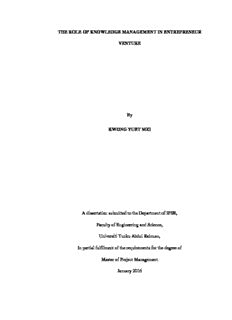Table Of ContentTHE ROLE OF KNOWLEDGE MANAGEMENT IN ENTREPRENEUR
VENTURE
By
KWONG YUET MEI
A dissertation submitted to the Department of IPSR,
Faculty of Engineering and Science,
Universiti Tunku Abdul Rahman,
In partial fulfilment of the requirements for the degree of
Master of Project Management
January 2016
DEDICATION
This dissertation is dedicated to
my family.
ABSTRACT
THE ROLE OF KNOWLEDGE MANAGEMENT IN ENTREPRENEUR
VENTURE
KWONG YUET MEI
Knowledge is powerful because it controls access to opportunity and
advancement. A valuable asset to the company, it became crucial for company to
harvest knowledge. The process of harnessing knowledge is known as knowledge
management (KM). In today’s increasingly competitive business environment,
KM is indeed, vital for any organization. However, the benefits of KM have not
been fully exploited, particularly by entrepreneurs. Therefore, this paper aims to
study KM in small-medium enterprise (SMEs) within Malaysia.
A comprehensive literature review was conducted and the outcome was used in
the questionnaire to explore the critical success factors (CSFs) of KM in
entrepreneurial venture and to identify the relationship between CSFs and KM
success. The CSFs are sorted into following factor groups: Responsibility of
Senior Management, Organizational Culture, Information Technology (IT), KM
Strategy, Human Resource Management (HRM), and Organizational Structure.
iii
Seventy-three (73) SMEs in Malaysia that practice KM in their organizations,
participated in the study. All questionnaires were distributed face-to-face.
Responses were recollected on the spot. Cronbach Alpha’s, descriptive statistics,
RII and binary logistics regression were applied to derive the survey results.
The study concludes that good knowledge structure, appropriate IT infrastructure
for KM, and strong trust relationship are among the most important CSFs of KM
implementation in Malaysia’s SMEs. This research also found that support and
commitment from top management, collaborative culture, knowledge
maintenance, incentives and rewards are among the nine (9) CSFs that are
significant to KM success. The findings of this study serve as a guideline for
SMEs to succeed in their KM implementation.
iv
ACKNOWLEDGEMENT
First and foremost I offer my sincerest gratitude to my supervisor, Mr Jeffrey Yap
Boon Hui, who has supported me throughout this research with his patience and
knowledge whilst allowing me the room to work in my own way. His willingness
to motivate me contributed tremendously to this project.
Besides, I would like to acknowledge Universiti Tunku Abdul Rahman (UTAR)
for providing me with a good environment and facilities to complete this project.
An honorable mention goes to my friends for their help and understandings while
I tried to complete this study. Without the opinions from them, this research
would not have been successful.
Last but not least, my deepest gratitude goes to my beloved parents for their
endless love, prayers, and encouragement. I offer my regards and blessings to all
those who supported me in any respect during the completion of this study.
v
APPROVAL SHEET
This thesis entitled “THE ROLE OF KNOWLEDGE MANAGEMENT IN
ENTREPRENEUR VENTURE” was prepared by KWONG YUET MEI and
submitted as partial fulfilment of the requirements for the degree of Master of
Project Management at Universiti Tunku Abdul Rahman.
Approved by:
(Mr. Jeffrey Yap Boon Hui) Date:
Supervisor
Department of IPSR
Faculty of Engineering and Science
Universiti Tunku Abdul Rahman
vi
FACULTY OF ENGINEERING AND SCIENCE
UNIVERSITI TUNKU ABDUL RAHMAN
Date: 16/04/2016
SUBMISSION OF THESIS
It is hereby certified that Kwong Yuet Mei (10ACB01003) has completed this
thesis entitled “THE ROLE OF KNOWLEDGE MANAGEMENT IN
ENTREPRENEUR VENTURE” under the supervision of Mr Jeffrey Yap Boon
Hui from the Department of IPSR, Faculty of Engineering and Science.
I understand that the University will upload softcopy of my thesis in pdf format
into UTAR Institutional Repository, which may be made accessible to UTAR
community and public.
Yours truly,
(Kwong Yuet Mei)
vii
DECLARATION
I, Kwong Yuet Mei hereby declare that the thesis is based on my original work
except for quotations and citations which have been duly acknowledged. I also
declare that it has not been previously or concurrently submitted for any other
degree at UTAR or other institutions.
viii
TABLE OF CONTENTS
Page
ABSTRACT iii
ACKNOWLEDGEMENTS v
APPROVAL SHEET vi
SUBMISSION SHEET vii
LIST OF TABLES xii
LIST OF FIGURES xiv
LIST OF ABBREVIATIONS xv
CHAPTER
1.0 INTRODUCTION
1.1 Background 1
1.2 Problem Statement 2
1.3 Aim and Objective 3
1.4 Research Scope 3
1.5 Significance of Research 3
1.6 Research Methodology 4
1.7 Delimitation 4
1.8 Structure of Dissertation 5
ix
2.0 LITERATURE REVIEW
2.1 Knowledge 7
2.1.1 Types of Knowledge 8
2.2 Knowledge Management 9
2.3 KM Process 11
2.4 SME 12
2.5 KM in SMEs 13
2.6 CSFs in KM Implementation 20
2.6.1 Responsibility of Senior Management 20
2.6.2 Organizational Culture 22
2.6.3 Information Technology 24
2.6.4 Knowledge Structure 25
2.6.5 Human Resource Management 26
2.6.6 Organizational Structure 28
2.7 Indicator of KM Success 29
3.0 RESEARCH METHODOLOGY
3.1 Overview 34
3.2 Research Design 35
3.3 Research Approach 36
3.4 Sources of Data 37
3.5 Conceptual Framework 38
3.6 Research Questions 38
3.6.1 Hypothesis 39
x
Description:Senior Management, Organizational Culture, Information Technology (IT), KM. Strategy, Human . is essential to assess KM success “a complex socio-technical system that numerical features of the data (Antonius 2003.

